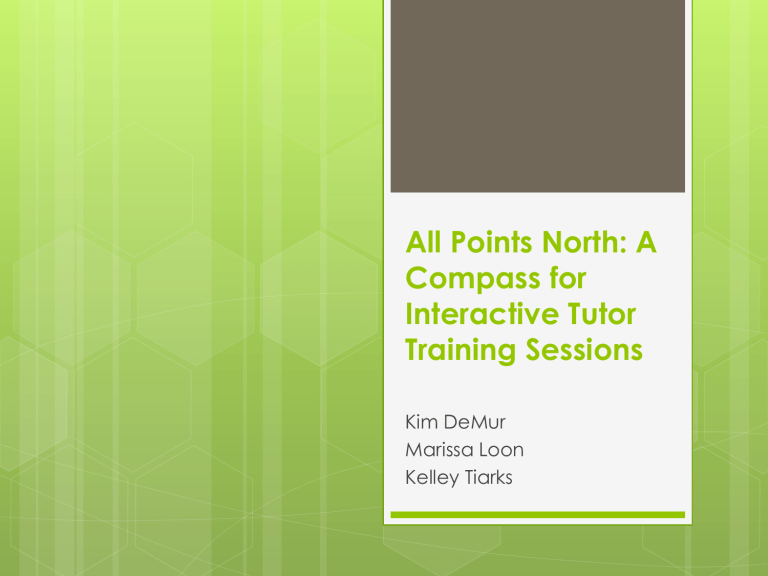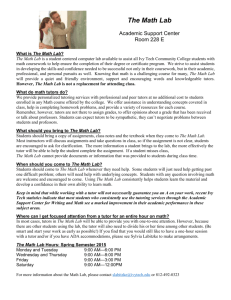Interactive Tutor Training

All Points North: A
Compass for
Interactive Tutor
Training Sessions
Kim DeMur
Marissa Loon
Kelley Tiarks
Who We Are
Kim DeMur
Assistant Director of Academic Advising at
Worcester Polytechnic Institute (Worcester, MA)
Marissa Loon
Director of the Academic Resource Center at
Nichols College (Dudley, MA)
Kelley Tiarks
Assistant Director of the Academic Center for
Excellence and Peer Tutoring at Bryant University
(Smithfield, RI)
Objectives
Review the characteristics of our common target population
Learn strategies for implementing effective, interactive pedagogical tools for tutor trainings
Discover engaging and practical tutor training activities
Learn strategies for implementing the same or similar activities into your own training
Learn about resources for locating training materials and activities
Importance & Framework
Millennial students (our tutors) are teamorientated and favor learning in groups.
Research suggests educators spend no more than 15 minutes lecturing before group discussion.
Carlson, S. (2005). The net generation in the classroom. Chronical of Higher Education, 52(7), 34-37.
Howe, N., & Strauss, W. (2000). Millennials rising: The next generation. New York: Vintage.
Importance & Framework
Engagement between tutors during training = increased confidence and pedagogy for working with peers during sessions.
As tutor trainers, we should be incorporating interactive, experiential components to build community amongst our staff, and help them further develop their skills and confidence.
Today’s Agenda
Group activities
Discussion of how these activities can be administered
How we as an organization can share tools, activities, and ideas
Activity 1 - WPI
“How It’s Done Challenge”
Training Topics:
Techniques for successfully beginning and ending a tutor session
Modeling problem solving
Activity 2 - Nichols
“Communications Through Construction”
Training Topics:
Communication Skills
Learning Styles
Active Listening
Probing Questions
Activity 3 - Bryant
“Agree, Disagree, Unsure”
Training Topics:
Ethical Dilemmas
Problem Solving
Too often, we as tutor trainers have grand plans and ideas for implementing interactive and engaging tutor training modules that get lost in the shuffle of our many other daily tasks.
Wouldn’t it be great to share our ideas with each other, and utilize our resources, just as we tell our students to do?!
Dropbox http://bitly.com/1wJkImG
Discussion
How many of you have had grand ideas that just fall flat?
Ever look for training ideas but just can’t find any?
Ever find that you just don’t have as much time to prep as you would like?
Discussion
Who trains your tutors?
What is the structure of your training?
Do you find all training topics relevant to your center?
How do you balance training new vs. veteran tutors?
How (if at all) do you engage “head tutors”?
What are the modes of training that you use?
References
Calma, A. & Eggins, M. (2012). Enhancing the quality of tutorials through peer-connected tutor training. Issues in Educational Research, 22(2),
213-227.
Carlson, S. (2005). The net generation in the classroom. Chronical of
Higher Education, 52(7), 34-37.
Howe, N., & Strauss, W. (2000). Millennials rising: The next generation.
New York: Vintage.
Werth, E.P. & Werth, L. (2011). Effective training for Millennial students.
Adult Learning, 22(3), 12-19.
Wilson, W.L. (2012). Dealing with difficult tutoring situations. In K. Agee, &
R. Hodges (eds.), Handbook for Training Peer Tutors and Mentors
(pp.296-299). Mason, Ohio: Cengage Learning.




